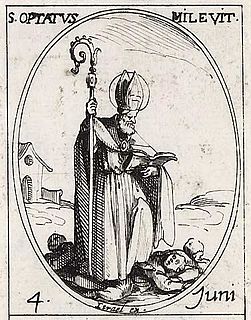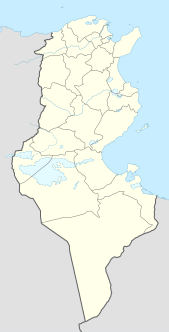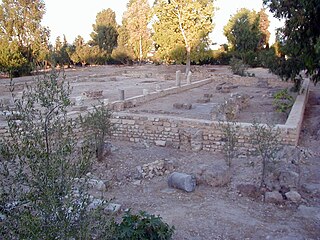

Felicianus of Musti (also known as Felician or Felixianus) was a bishop of Musti in Numidia, Roman North Africa, involved in the Donatist controversy of the 4th century. [1] He is known to history through the writings of Augustine of Hippo Regius.


Felicianus of Musti (also known as Felician or Felixianus) was a bishop of Musti in Numidia, Roman North Africa, involved in the Donatist controversy of the 4th century. [1] He is known to history through the writings of Augustine of Hippo Regius.
Felicianus was a member of the Donatists, an excommunicated movement which was critical of the Roman Catholic Church following the effects of the edict of Milan, when Christianity was becoming closely aligned with the Roman government. Felicianus joined and became a leader within a breakaway group of Donatists called the Maximianists, who took a more puritanic line than the Donatists. [2]
According to some Catholic sources, the Donatists tried unsuccessfully to remove Felicianus from his see, and then used the imperial law courts to compel him to return. [3] Whether this is true or Felicianus was just uncomfortable with the extremism of Maximianist theology is unknown, but Felicianus and another Maximianist leader, Praetextatus of Assur, did return to the Donatist party with their respective congregations. None were re-baptised, which was claimed by their opponents as hypocrisy. [4]
Re-baptism of the lapsed was a core belief of the Donatists. Augustine wrote a strenuous condemnation of Felicianus of Musti in one of his letters [5] and singled out Felicianus as an example of inconsistency in the Donatist movement. [6] [1] The return of Felicianus was a pivotal moment in the demise of the Maximianist movement and the return of many congregations to the Donatists. [3] It was also one of three components to Augustine's attack on the Donatists.[ clarification needed ]

Augustine of Hippo, also known as Saint Augustine, was a theologian, philosopher, and the bishop of Hippo Regius in Numidia, Roman North Africa. His writings influenced the development of Western philosophy and Western Christianity, and he is viewed as one of the most important Church Fathers of the Latin Church in the Patristic Period. His many important works include The City of God, On Christian Doctrine, and Confessions.
Pope Miltiades, also known as Melchiades the African, was the bishop of Rome from 311 to his death on 10 or 11 January 314. It was during his pontificate that Emperor Constantine the Great issued the Edict of Milan (313), giving Christianity legal status within the Roman Empire. The pope also received the palace of Empress Fausta where the Lateran Palace, the papal seat and residence of the papal administration, would be built. At the Lateran Council, during the schism with the Church of Carthage, Miltiades condemned the rebaptism of apostatised bishops and priests, teaching of Donatus Magnus.

Donatism was a heresy leading to schism in the Church of Carthage from the fourth to the sixth centuries AD. Donatists argued that Christian clergy must be faultless for their ministry to be effective and their prayers and sacraments to be valid. Donatism had its roots in the long-established Christian community of the Roman Africa province in the persecutions of Christians under Diocletian. Named after the Berber Christian bishop Donatus Magnus, Donatism flourished during the fourth and fifth centuries.

Cirta, also known by various other names in antiquity, was the ancient Berber and Roman settlement which later became Constantine, Algeria. Cirta was the capital city of the Berber kingdom of Numidia; its strategically important port city was Russicada. Although Numidia was a key ally of the ancient Roman Republic during the Punic Wars, Cirta was subject to Roman invasions during the 2nd and 1st centuries BC. Eventually it fell under Roman dominion during the time of Julius Caesar. Cirta was then repopulated with Roman colonists by Caesar and Augustus and was surrounded by a "confederation of free Roman cities" such as Tiddis, Cuicul, and Milevum. The city was destroyed in the beginning of the 4th century and was rebuilt by the Roman emperor Constantine the Great, who gave his name to the newly constructed city, Constantine. The Vandals damaged Cirta, but emperor Justinian I reconquered and improved the Roman city. It declined in importance after the Muslim invasions, but a small community continued at the site for several centuries. Its ruins are now an archaeological site.
Marcellinus of Carthage was a Christian martyr and saint who died in 413. He was secretary of state of the Western Roman Empire under Roman emperor Honorius and a close friend of Augustine of Hippo, as well as a correspondent of Saint Jerome's. Saint Augustine dedicated the first books of his landmark The City of God to Marcellinus in 413.

Musti or Mustis was an ancient city and bishopric in the Roman province of Proconsular Africa, now in northern Tunisia. Its ruins, called Mest Henshir, are about eight miles from Dougga, near Sidi-Abd-Er-Rebbou. It is also a Catholic titular see.

Saint Optatus, sometimes anglicized as St. Optate, was Bishop of Milevis, in Numidia, in the fourth century, remembered for his writings against Donatism.
Possidius was a friend of Augustine of Hippo who wrote a reliable biography and an indiculus or list of his works. He was bishop of Calama in the Roman province of Numidia.
Fussala was a town in the Roman province of Numidia that became a Christian bishopric. The town and bishopric disappeared after the Muslim conquest of the Maghreb, but the bishopric has been revived as a titular see of the Catholic Church,

Sufes was a town in the late Roman province of Byzacena, which became a Christian bishopric that is included in the Catholic Church's list of titular sees.

The Archdiocese of Carthage, also known as the Church of Carthage, was a Latin Catholic diocese established in Carthage, Roman Empire, in the 2nd century. Agrippin was the first named bishop, around 230 A.D. The temporal importance of the city of Carthage in the Roman Empire had previously been restored by Julius Caesar and Augustus. When Christianity became firmly established around the Roman province of Africa Proconsulare, Carthage became its natural ecclesiastical seat. Carthage subsequently exercised informal primacy as an archdiocese, being the most important center of Christianity in the whole of Roman Africa, corresponding to most of today's Mediterranean coast and inland of Northern Africa. As such, it enjoyed honorary title of patriarch as well as primate of Africa: Pope Leo I confirmed the primacy of the bishop of Carthage in 446: "Indeed, after the Roman Bishop, the leading Bishop and metropolitan for all Africa is the Bishop of Carthage."
Musti in Numidia, also called Musti Numidiae, was an ancient city and bishop jurisdiction (bishopric), and is presently a Catholic titular see,(bishop's government see of a former government under a church's responsibility, also known as a dead diocese.) in modern Algeria.

Majorinus was the leader of a schismatic Christian sect in Roman North Africa known as the Donatists.
Maximian of Bagai was a 5th century bishop of Bagai in Roman North Africa. His life shows the extent that the religious schism in Roman North Africa could become violent.
Optatus of Thamugadi was, from 388 to 398, a donatist bishop in the city of Thamugadi (Timgad) in the Roman province of Numidia. He was an important subject in the anti-donatistic polemic of Augustine, who was at that time a bishop in Hippo Regius and who called him evil.
Primian (Primianus) was an early Christian Bishop of Carthage, and leader of the Donatist movement in Roman North Africa. Seen as a moderate by some in his faction, he was a controversial figure in a time of fragmentation of the Donatists, a reactionary branch of Christianity.

Bagai was a Roman–Berber city in the province of Africa Proconsularis. It must have been of some reasonable size, as it was also the seat of an ancient Catholic bishopric. The ancient city has been identified with ruins at Ksar-Bagaï outside of Baghai, in the Aurès Mountains of the El Hamma District in Khenchela Province, Algeria.
Asellicus of Tusuros was a 4th-century bishop of Tusuros, a Roman Town in what was Roman North Africa. He is known for being outspoken at the Council of Carthage of 411 and from a number of epistles with Augustine and Donatian of Reims.
Cabarsussi, was an ancient civitas (municipality) and bishopric in the Roman province of Byzacena, that is tentatively identifiable with ruins at Drâa-Bellouan in modern Tunisia. The current bishop is Terence Robert Curtin, auxiliary bishop of Melbourne.

Petilianus was an eminent Donatist of the 5th century Roman North Africa, who is known to history through the letters he wrote to the Catholic Bishop Augustine of Hippo and discourses in Augustine's replies. Although most of what we know of him comes from Augustine, his main theology seems to have been "that the true church was only composed of those who were repentant."